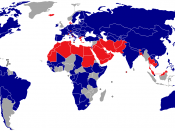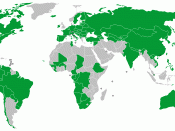Introduction to Area Studies, Section A Instructor: E. Erol March 27, 2014
Word count: 1490
Two and a half years ago, Turkish prime-minister Erdogan visited Tunisia, the country where the so-called Arab Spring began. During his visit, Erdogan delivered a speech in which he made the case for "the Turkish model" to be accepted by the revolting Arab nations. When describing his country's model, he said: "Turkey is 99 percent Muslim, yet it is a democratic secular state where all religions are equal." (Feuillatre, 2011, paragraph 8). Erdogan's description of Turkey as a secular state is not only claimed to be accurate by Turkish politicians, it is also widely accepted in western media. When an editor of the New Statesman described a trip to Turkey nine years before Erdogan delivered his speech in Tunisia, he described how he had formed the strong impression that Turkey, "the only secular Muslim country in the world" (Bose, 2002, paragraph 7), had mastered the art of divorcing religion and state.
When it comes to the secular character of the Turkish Republic, both historical developments and contemporary issues give significant reasons to question the correctness of Erdogan's description and the editor's impression. In this essay, I will argue that the widespread conception of Turkey as a secular state is not accurate. In doing so, I will first consider the historical development of the relationship between state and religion in Turkey. Then, I will discuss two contemporary matters which demonstrate that the Turkish Republic is not a secular state. The principle of laiklik Founding the Turkish Republic, modern Turkey's founding fathers in many ways made a radical break with the Ottoman past. The Kemalists' ideal of a secular,


